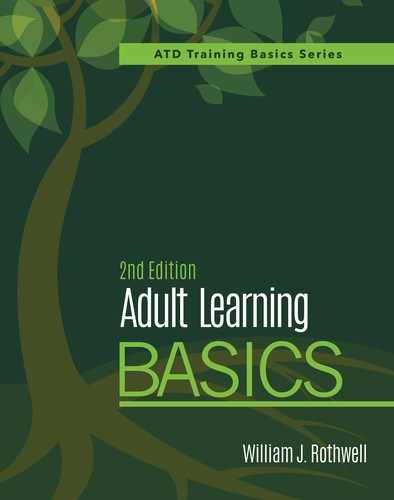Contents
About the Training Basics Series
1. Understanding and Applying Adult Learning Theory
Why Knowing How Adults Learn Is Important
How Training, Talent Development, and Learning Differ
How Learning Can Influence Organizational and Individual Success
Linking Talent Development to Organizational Strategy
The Role of Chief Learning Officer
2. Theories and Models of Adult Learning
Important New Terms Relevant to Learning
New Approaches and New Thinking on Learning
3. Using Theory to Design More Effective Learning Experiences
How Does a Learning Facilitator’s Philosophy Influence Practice?
How Theories of Learning May Affect Instruction and Training
A Model of the Learning Process
Applying a Model of the Workplace Learning Process
How Facilitation Relates to Learning
What Is Unique About the Mental, Physical, and Emotional Characteristics of Adults?
The Role the Senses Play in Learning
4. Designing Learning Experiences
5. Leveraging Adult Learner Differences
What Principles of Adult Learning Are Important for Learning Professionals?
Considering the Barriers Faced by Adults in Learning
How Learning Science Affects What Is Known About the Brain and the Learning Process
Individual Development Planning
6. Managing Cultural Differences in Learners
How Cultural Intelligence Influences Adult Learning
7. Making Learning Environment a Key to Success
How Does Learning Climate Affect Individual Learning?
What Are Learning Competencies?
How Do Learning Competencies Relate to Job Competencies?
How Do Learning Competencies Affect Individual Learning?
How Is the Talent Developer’s Role Influenced by Learning Climate and Learning Competencies?
How Learning Climate Influences Adult Learning
How Is Learning Climate Improved?
8. Putting Technology to Work for Learners
What Technologies Affect Adult Learning?
How Technology Affects Adult Learning
9. Using Proven Facilitation Techniques to Drive Learning
What Is a Facilitator, and How Is a Facilitator Different From an Instructor?
The Role of Facilitators in Clarifying Roles and Ground Rules
Learners’ Roles in Facilitated Learning and Meeting Special Challenges
Facilitator Competencies and Behaviors
Differences Among On-Site, Online, and Blended Format Facilitator Behaviors
10. Reading the Future of Adult Learning: Seven Hopeful Predictions
Prediction 1: More Focus on Informal and Incidental Learning
Prediction 2: More Appreciation for Feelings, Values, Ethics, and Cultural Awareness
Prediction 3: Increasing Interest in the Special Needs of Older Adult Learners
Prediction 4: Increasing Sensitivity to Diversity Among Talent Developers and Adult Educators
Prediction 5: Technology’s Impact on Learning Will Continue Unabated
Prediction 7: More Attention Will Focus on the Context in Which Learning Occurs
